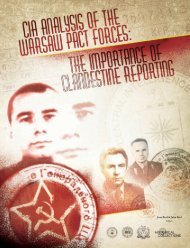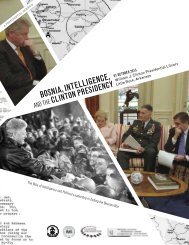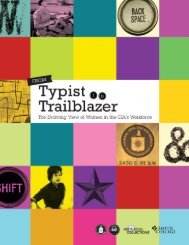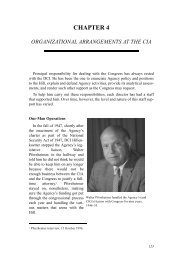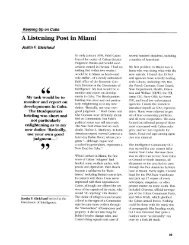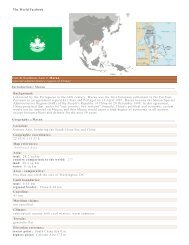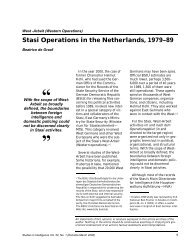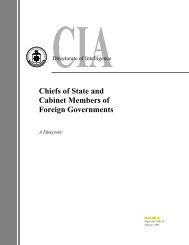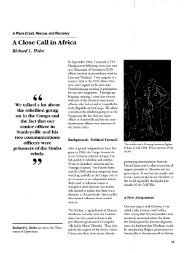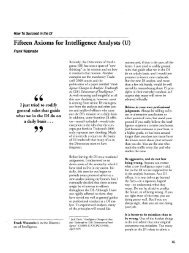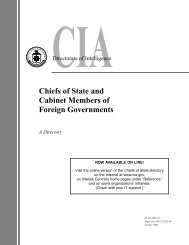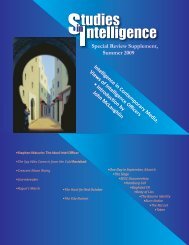Analytic Culture in the U.S. Intelligence Community (PDF) - CIA
Analytic Culture in the U.S. Intelligence Community (PDF) - CIA
Analytic Culture in the U.S. Intelligence Community (PDF) - CIA
Create successful ePaper yourself
Turn your PDF publications into a flip-book with our unique Google optimized e-Paper software.
COMBATING ETHNOCENTRISM<br />
representative red team. There is <strong>the</strong> obvious problem of security. Someone<br />
fully able to represent <strong>the</strong> adversary culturally would very likely be unable to<br />
obta<strong>in</strong> requisite clearances for participation <strong>in</strong> a classified red team exercise.<br />
In fact, even if it were possible to f<strong>in</strong>d someone both culturally representative<br />
and sympa<strong>the</strong>tic to <strong>the</strong> goals of <strong>the</strong> red team, such as <strong>the</strong> participant born <strong>in</strong><br />
<strong>the</strong> region, <strong>the</strong> conflicts triggered by that sympathy, cultural identity, and cultural<br />
allegiance could well lead to unforeseen cognitive biases that would be<br />
difficult to counteract. 10<br />
An alternative is to f<strong>in</strong>d an ethnic American citizen with similarities to <strong>the</strong><br />
people of <strong>the</strong> region of <strong>in</strong>terest, but simply f<strong>in</strong>d<strong>in</strong>g a US citizen with <strong>the</strong> same<br />
ethnicity as those of <strong>the</strong> region of <strong>in</strong>terest does not guarantee any special<br />
<strong>in</strong>sight <strong>in</strong>to <strong>the</strong>ir th<strong>in</strong>k<strong>in</strong>g. Ethnicity is not <strong>the</strong> same as shar<strong>in</strong>g culture or identity.<br />
Not all ethnic groups <strong>in</strong> <strong>the</strong> US are isolated and self-perpetuat<strong>in</strong>g. Many,<br />
<strong>in</strong> fact, put great effort <strong>in</strong>to try<strong>in</strong>g to assimilate <strong>in</strong>to <strong>the</strong> larger “American culture”<br />
by distanc<strong>in</strong>g <strong>the</strong>mselves from <strong>the</strong>ir culture of orig<strong>in</strong>. These people often<br />
struggle with <strong>the</strong>ir own concept of cultural identity and <strong>the</strong> broader issues of<br />
community affiliation. 11 Many immigrants and most first-generation offspr<strong>in</strong>g<br />
have already begun <strong>the</strong> process of acculturation. More strik<strong>in</strong>g, <strong>the</strong>ir offspr<strong>in</strong>g<br />
display a process of enculturation <strong>in</strong> <strong>the</strong> US by learn<strong>in</strong>g <strong>the</strong> language, attend<strong>in</strong>g<br />
<strong>the</strong> schools, assimilat<strong>in</strong>g local and national values, and establish<strong>in</strong>g ties to<br />
a diverse community outside of <strong>the</strong>ir own ethnic enclave. In fact, <strong>the</strong> children<br />
of recent immigrants share many of <strong>the</strong> same cognitive filters as those who are<br />
generations removed from migration. That said, <strong>the</strong>re are American citizens<br />
born <strong>in</strong> <strong>the</strong> region of <strong>in</strong>terest, like <strong>the</strong> member of <strong>the</strong> red team <strong>in</strong> which I participated,<br />
who do have <strong>in</strong>sight <strong>in</strong>to specific cultures, pr<strong>in</strong>cipally because <strong>the</strong>ir<br />
enculturation was affected by be<strong>in</strong>g born <strong>in</strong>, and liv<strong>in</strong>g <strong>in</strong>, a foreign region.<br />
The participant <strong>in</strong> that red team was a foreign-born American citizen, but<br />
foreign birth is not a necessary condition for enculturation. 12 Liv<strong>in</strong>g <strong>in</strong> a foreign<br />
region, speak<strong>in</strong>g <strong>the</strong> language, <strong>in</strong>teract<strong>in</strong>g with <strong>the</strong> people, develop<strong>in</strong>g<br />
community ties, and establish<strong>in</strong>g an identity with<strong>in</strong> that community are all<br />
part of <strong>the</strong> acculturation process and allow one to alter <strong>the</strong> cognitive filters<br />
through which one <strong>in</strong>terprets <strong>the</strong> world. Time spent on a US military base, <strong>in</strong> a<br />
US embassy, or <strong>in</strong> a Western hotel overseas does not lead to acculturation.<br />
10<br />
Philip Cushman, Construct<strong>in</strong>g <strong>the</strong> Self, Construct<strong>in</strong>g America; John Lucy, Language Diversity<br />
and Thought; Douglass Price-Williams, Explorations <strong>in</strong> Cross-Cultural Psychology; Marshall<br />
Segall, Cross-Cultural Psychology; Richard Shweder, Th<strong>in</strong>k<strong>in</strong>g Through <strong>Culture</strong>s; Yali Zou and<br />
Enrique Trueba, Ethnic Identity and Power; and Benjam<strong>in</strong> Whorf.<br />
11<br />
David Lev<strong>in</strong>son and Melv<strong>in</strong> Ember, American Immigrant <strong>Culture</strong>s. For raw data cover<strong>in</strong>g 186<br />
cultural groups s<strong>in</strong>ce 1937, <strong>in</strong>clud<strong>in</strong>g immigrants, see <strong>the</strong> Human Relations Area Files at Yale<br />
University.<br />
12<br />
Some anthropologists have argued that enculturation is specific to childhood but <strong>the</strong> evidence<br />
supports that it is a lifelong process. See Segall.<br />
83



